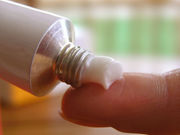Many patients non-persistent or over-persistent; 75 percent adherent to recalled frequency, regularity
MONDAY, April 25, 2016 (HealthDay News) — A considerable proportion of patients with actinic keratosis (AK) receiving long-term topical treatment have poor persistence or adherence, according to a study published online April 18 in the British Journal of Dermatology.
Sandra Erntoft, from LEO Pharma A/S in Denmark, and colleagues conducted a longitudinal study to examine self-reported patient adherence and persistence behavior with topical AK therapies. An online survey was conducted in Germany, France, and the United Kingdom from October 2012 to May 2013 among 224 patients with clinically confirmed AK who had been prescribed self-administered topical AK therapy starting one week before/after the baseline questionnaire.
The researchers found that 57 percent of patients reported a current prescription of diclofenac sodium. For each treatment, the mean recalled treatment duration was consistent with the label-recommended treatment duration. Overall, 72.3 percent of patients reported remaining on baseline treatment until the survey end (10 to 12 weeks post-treatment initiation). Twenty-three, 18, and 31 percent of patients were non-persistent, persistent, and over-persistent; for 28 percent, persistence was unknown. Most of the non-persistent subjects stopped treatment early during the course of treatment. Seventy-five percent of patients were adherent to both recalled frequency and regularity; more than 80 percent were adherent to one or the other.
“This study suggests patients receiving long-duration topical therapies experience issues that negatively impact adherence and persistence,” the authors write.
Several authors disclosed financial ties to Leo Pharma A/S, which funded the study.
Copyright © 2016 HealthDay. All rights reserved.








